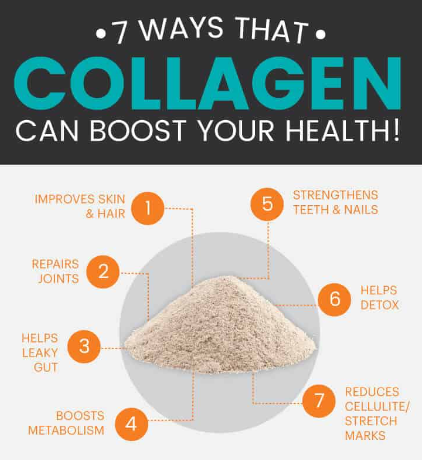Collagen: Fountain of Youth or Just Hype?
Discover the REAL benefits of collagen for skin, joints, and overall health. Myths and realities, usage tips, and scientific sources.
HEALTHBLOG-LIST
12/7/20243 min read


Collagen is everywhere! Creams, food supplements, powders... It is presented as a miracle ingredient for youthful skin and healthy joints. But what is the truth? In this article, we break down the benefits of collagen, unravel fact from fiction, and give you the keys to effectively integrating it into your routine.
Summary
Collagen: What exactly is it?
The benefits of collagen for the skin.
Collagen and joint health: a winning duo?
Collagen and overall health: other benefits.
How to boost your collagen production?
FAQ: Your questions about collagen.
Conclusion
In short
Collagen is a protein essential to the structure and elasticity of the skin, bones, and cartilage.
Its production decreases with age, which can lead to wrinkles, joint pain, and other health problems.
A balanced diet, dietary supplements, and topical treatments can help maintain optimal collagen levels.
1. Collagen: What exactly is it?
Collagen is the most abundant protein in the human body. Imagine it as a kind of "glue" that holds the different tissues of your body together. It is found mainly in the skin, bones, tendons, ligaments, and cartilage.
There are different types of collagen, each with a specific role. For example, type I collagen is most abundant in the skin, while type II is found in cartilage.
2. The benefits of collagen for the skin
This is the best-known benefit of collagen: its anti-aging action. Indeed, collagen is responsible for the firmness and elasticity of the skin. With age, its production decreases, leading to the appearance of wrinkles, fine lines, and sagging skin.
Several scientific studies have demonstrated the effectiveness of collagen in improving the appearance of the skin:
A study published in the Journal of Cosmetic Dermatology (1) showed that collagen supplementation for 8 weeks significantly improved skin hydration and elasticity.
Another study (2) revealed that taking collagen reduced wrinkle depth and increased collagen density in the skin.
Beware of misconceptions! Applying collagen directly to the skin is not a miracle solution. Collagen molecules are too large to penetrate the epidermis. Instead, opt for dietary supplements or creams containing hydrolyzed collagen peptides, which are more easily assimilated by the body.
3. Collagen and joint health: a winning duo?
Collagen is a major component of cartilage, the elastic tissue that covers the ends of bones and allows joints to move without friction. Osteoarthritis, a degenerative disease that affects millions of people, is characterized by cartilage breakdown.
Good news: collagen can contribute to the health of your joints!
A study published in the journal Osteoarthritis and Cartilage (3) showed that taking collagen reduced pain and improved mobility in patients with knee osteoarthritis.
Other research suggests that collagen may stimulate cartilage regeneration and slow the progression of osteoarthritis (4).
4. Collagen and overall health: other benefits
The benefits of collagen are not limited to the skin and joints. Exploratory studies suggest that it could also play a role in:
Intestinal health: collagen could help strengthen the intestinal barrier and reduce inflammation.
Bone health: collagen is an essential component of the bone matrix and could help prevent osteoporosis.
Cardiovascular health: some studies suggest that collagen could improve the elasticity of blood vessels.
5. How to boost your collagen production?
Even though collagen production naturally declines with age, it is possible to stimulate it by adopting a healthy lifestyle:
Diet: Consume foods rich in protein (meat, fish, eggs), vitamin C (citrus fruits, berries), and zinc (oysters, pumpkin seeds).
Sun protection: UV exposure accelerates collagen degradation. Protect your skin from the sun!
Sleep: Quality sleep promotes cell regeneration and collagen production.
Dietary supplements: Opt for supplements based on hydrolyzed collagen, preferably of marine origin.
Cosmetics: Choose creams containing collagen peptides or ingredients that stimulate its production (vitamin C, retinol).
6. FAQ: Your questions about collagen
Q: Which type of collagen should I choose? A: Marine collagen is generally better absorbed by the body. For the skin, choose type I collagen, for the joints type II.
Q: Are there any side effects to taking collagen? A: Collagen is generally well tolerated. Mild digestive upset may occur in some people.
Q: When will I see the first results? A: It takes several weeks, even months, to see visible results.
7. Conclusion
Collagen is much more than just a fad. This essential protein plays a crucial role in the health of the skin, joints, and the body in general. By adopting a holistic approach (diet, supplements, topical treatments), you can help maintain optimal collagen levels and enjoy its many benefits.
Sources:
(1) Proksch E, Segger D, Degwert J, Schunck M, Zague V, Oesser S. Oral supplementation of specific collagen peptides has beneficial effects on human skin physiology: a double-blind, placebo-controlled study. Skin Pharmacol Physiol. 2014;27(1):47-55.
(2) Borumand M, Sibilla S. Effects of a nutritional supplement containing collagen peptides on skin elasticity, hydration and wrinkles. J Med Nutr Nutraceut. 2014;4(1):47-53.
(3) Bello AE, Oesser S. Collagen hydrolysate for the treatment of osteoarthritis and other joint disorders: a review of the literature. Curr Med Res Opin. 2006 Nov;22(11):2221-32.
(4) McAlindon TE, Nuite M, Krishnan N, et al. Change in knee osteoarthritis cartilage detected by delayed gadolinium enhanced magnetic resonance imaging following treatment with collagen hydrolysate: a pilot randomized controlled trial. Osteoarthritis Cartilage. 2011 May;19(5):524-31.
